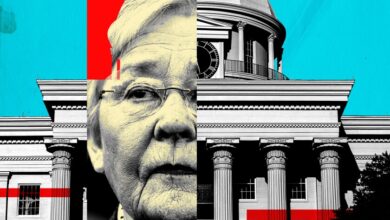Jordan Peterson’s Next Move? Taking Out the Universities

Those were Jordan Peterson’s first words when he took the stage recently at a theater in Austin, Tex., as part of his “Beyond Order: 12 More Rules for Life” tour. What followed was a description of an encounter with a Canadian politician who believes that vaccination mandates violate that country’s charter of rights and who, not incidentally, helped draft the charter. Peterson segued from that hot topic to what longtime observers of him will recognize as familiar ground: Freud, Jung, the Old Testament, and, inevitably, the Nazis. The theme connecting this buffet of anecdotes and analysis was society’s fragmentation. “So what the hell is going on?” he asked the well-dressed, well-mannered crowd of nearly 3,000, some of whom had paid several hundred dollars to witness Peterson’s quirky brand of psychohistorical freestyle. “That’s the real question, isn’t it?”
You might also ask what the hell is going on with Peterson. Last month he stepped down as a professor of psychology at the University of Toronto after more than two decades (he’s officially emeritus now). He blamed his premature retirement on, among other things, diversity and inclusion efforts — “woke madness,” he called it — that he believes are poisoning the academy. He also fears that any graduate student he might supervise would have trouble finding a job given that, in some circles, Jordan Peterson’s name on your CV might as well be the mark of the beast. “These facts rendered my job morally untenable,” he wrote in a typically no-holds-barred resignation essay. He worked in a few parting jabs at his erstwhile colleagues, professors who are “cowering cravenly in pretence and silence. Teaching your students to dissimulate and lie. To get along. As the walls crumble. For shame.” When someone on Twitter asked how he would spend his time now, he replied: “Taking out the universities.” He so far hasn’t revealed how exactly he plans to do that, or even what the threat means.
His animus shouldn’t come as a surprise. For years he’s been calling universities scams and indoctrination cults, and declaring entire fields, including sociology, anthropology, and English literature, corrupt. He’s castigated colleges for luring students with promises of enlightenment and leaving them philosophically adrift and mired in debt. “They rob your future self while allowing you to pretend you have an identity,” he once said. It’s a wonder he stuck around as long as he did.
And then, in 2019, Peterson more or less … disappeared. Rumors abounded about illness and addiction. In the introduction to his most recent book, Beyond Order, he confirms that he struggled to wean himself off the anti-anxiety drug benzodiazepine, and tells the harrowing tale of how he landed in a treatment center in Russia — a country whose history Peterson returns to, again and again, in his writing and speaking. He was placed in a coma so he wouldn’t be conscious during the worst of the withdrawal symptoms and had to relearn how to dress himself. He was, as he explained on a podcast last summer, “out of sync with the entire world for a good, long time.”

Mark Peterson, Redux
I met Peterson in the fall of 2017, back when his fame was starting to gather steam. It seemed amazing that he had a couple of hundred thousand Twitter followers (he now has more than two million) and close to a half-million YouTube subscribers (he now has 10 times that number). I drank mint tea with him in his tiny den, the walls of which were covered with Soviet agitprop posters. The following night he would deliver a two-hour lecture on the book of Genesis to 500 devotees, many of whom had seen him in person multiple times; the most committed among them would gather afterward at a bar to dissect that evening’s performance. He hinted at health problems during our conversation and admitted to feeling unsure how to handle his newfound celebrity. “It’s surreal. It’s mostly terrifying,” he told me then. “If I was younger, it would probably be more exhilarating. I think the reason it’s mostly terrifying is that a lot of the advantages it might bring me — wealth, say, and fame — are of somewhat limited utility at my age. I have grandchildren, I have a house, I have a wife. I’m not interested in meeting a bunch of new women, let’s say. You know what I mean?”
Limited utility or not, the situation has grown only more surreal. He recently recorded a four-hour podcast with Joe Rogan, who plays host to scientists, philosophers, and crackpots alike, and who has taken heat lately for encouraging vaccine skepticism. Peterson showed up, raring to go, wearing a tuxedo. During that marathon conversation, he touched on the feminine forces of chaos, dominance hierarchies, the viability of nihilistic beliefs, and how fans greet him like an old friend. What made headlines, though, was his assertion that climate models are flawed because they can’t take everything into account. (“There’s no such thing as climate,” he told Rogan.) Objections from understandably frustrated climate scientists followed. Peterson is at his worst when he’s holding forth confidently on issues outside his domain, and at his most cringeworthy when those issues — like the reality of human-induced climate change — truly matter.
During his Austin show, he mostly steered clear of such topical territory. Peterson told a story about a clever prison inmate he once met who had savagely beaten a suspected snitch. He reminisced about a patient he had treated, back when he was still a practicing clinical psychologist, who was terrified of elevators, and another with cognitive deficits so severe he struggled to fold a piece of paper and place it in an envelope. Even his digressions have digressions, but that’s par for the course: Peterson’s lectures aren’t usually burdened by any one particular thesis. And if you’ve listened to him enough, you can sometimes sense where he’s going, whether it’s an aside about the courage of Aleksandr Solzhenitsyn or re-emphasizing the significance of the Nuremberg trials. His verbal tics are so well known that fans could create a drinking game (if you downed a shot every time he said “hell” or “evil,” someone would need to carry you home). For Peterson veterans, it’s like hearing a live rendition of an album you know by heart. But if this was your first exposure to his unfettered rhetorical approach, you might not know what the excitable guy with the gray beard was going on about.
Still, Peterson has his moments. During a Q&A session following his lecture, someone asked about the wisdom that’s gained from taking psychedelic drugs. This is how he replied: “There’s a miraculously infinite amount of richness everywhere, but you can’t wander around thinking that all the time because you just wouldn’t get anything done. It’s too complex to see everything at once. Take a psychedelic, and you’ll see everything at once, and that’s the beatific vision, but there’s a danger in that because you’ll also see, in some ways, your relationship to that, which is infinite in scope, along with your moral responsibility. And if you realize that simultaneously and contrast that with who you are currently, in your embittered and fragmented partial form, that can produce a moral burden that’s intolerable.” His daughter, Mikhaila, who serves as an MC of sorts on his current tour and has become known for promoting an all-meat diet that both she and her father follow, declared his answer “cool.”
Peterson mentioned that, for a time, he held the same position in Harvard’s psychology department as Timothy Leary. Peterson left the university before coming up for tenure, while Leary was too busy leading a counterculture movement to show up for class. There are parallels between the two other than Harvard and a shared interest in psychedelics. They both befriended celebrities (Leary was buddies with John Lennon, and Peterson has been pictured lately with the likes of Elon Musk and Skrillex). They both became so well known that it was impossible for them to continue as professors. They both got sidetracked for a while (Leary ended up in jail for marijuana possession; Peterson ended up in Moscow, battling his demons). At 59, the same age Peterson is now, Leary was performing as a “stand-up philosopher” in nightclubs, while Peterson is playing to sold-out theaters.
So what’s Peterson’s next act, other than taking out the universities? He told Joe Rogan he’s going to be chancellor of Ralston College, a fledgling institution in Savannah, Ga., that aims to be a “revival and reinvention of the traditional university.” He’s promoting an app that helps students write essays. He’s admitted to entertaining the idea of running for office over the years, and his criticism of Canada’s current prime minister, Justin Trudeau, could be mistaken for the beginning of a campaign. As Peterson would say, Who the hell knows? It’s already a crazy story.
Source link






